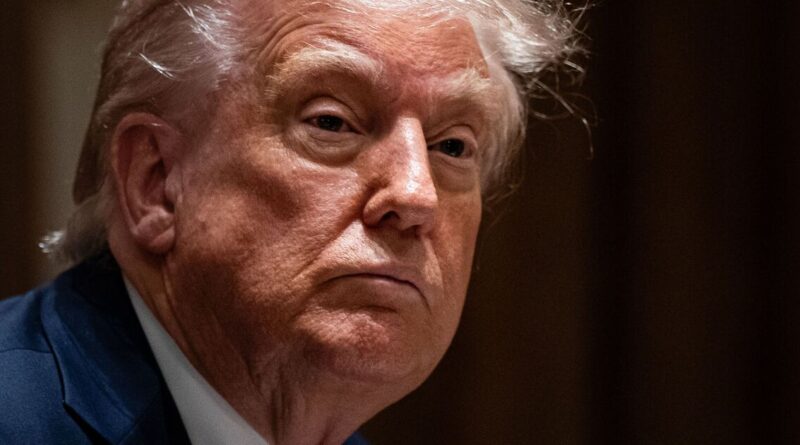Trump leaves one of US’ closest allies isolated as president ‘wants Nobel Peace Prize’ | World | News
Benjamin Netanyahu is being forced to contemplate the prospect of a nuclear Iran, with sources in Tel Aviv suggesting the Israeli PM is feeling increasingly isolated over the issue. It comes as the US prepares to enter a third round of negotiations with the Islamic regime in Oman on Sunday.
Donald Trump’s return to the White House had been seen as the missing piece which would allow Netanyahu to settle the issue of a nuclear Iran once and for all. And Israel’s successful air strikes in October, which neutralised most of Iran’s Russian-built air defence systems, had opened up a brief window of opportunity for a coordinated attack against nuclear facilities. However, these would only ever have been completely successful if carried with US forces, which possess the heavy bunker-busting ordnance necessary to penetrate the mountain lairs where many of these facilities are now buried.
These include the county’s main uranium-enrichment site in Natanz, south of Tehran.
When the US President extended the offer for talks, it was to a regime that maintained it would not negotiate over what it saw as a sovereign capability.
Supreme Leader Ayatollah Ali Khamenei’s recent shift on this issue, thought to have been promoted by the prospect of military air strikes, is said to have caught Trump by surprise, and he now sees an opportunity for one of his iconic deals.
“Trump wants the Nobel Peace Prize, and Iran needs to rebuild its economy, so the chances of an agreement are good. Don’t be surprised if this also ends up including a major arms deal between Washington and Tehran,” said former Mossad official Rami Igra.
It has left Netanyahu – who has already reportedly been told by his US ally not to carry out any military strikes against Iran, unable to act.
To make matters worse for Israel, even the best outcome to any nuclear deal will not oblige Iran, which says it plans to build 19 nuclear reactors for civilian purposes, to undergo a complete Libya-style denuclearisation programme.
“We will not back down from our achievements, nor will we compromise on them, and we will never allow anyone to prevent us from thinking or to prevent us from being innovative and creative,” said Iran’s President Masoud Pezeshkian recently.
While Iran is an oil rich country, the heavy subsidies which Iran’s Government is having to offer to make fuel affordable to normal Iranians make the advent of nuclear power attractive.
And this seems to have been accepted by the US, with Secretary of State Marco Rubio saying: “The Iranians have shown a willingness to talk. We’re going to talk to them. If Iran wants a civil nuclear programme, they can have one just like many other countries in the world have one. That is, they import enriched material.”
But there is little trust in Israel over Iranian assurances that its nuclear programme will remain dedicated for civilian use.
Iran admittedly breached the last nuclear deal, signed with US President Barack Obama, France, Germany, and the UK in 2015 on several occasions after Donald Trump withdrew the US’ participation.
These included the firing up of advanced uranium-enriching centrifuges installed at its underground plant at Natanz.
The situation is “unlike Trump’s previous term, when the administration was full of hawkish right-wing Republican elements who fully understood the significance of an Iranian nuclear programme and worked shoulder to shoulder with Israel,” an Israeli diplomatic official told Al-Monitor.
“Trump is now surrounded by people who are much less ideological and experienced, such as the national security adviser, the defence secretary and the mediators Witkoff and Boehler, who are loyal to the president and less interested in the national security of Israel or the region,” the diplomatic source added.
Israel has already stated that it will only accept a US-Iran deal if it completely dismantles the Iranian nuclear production infrastructure.
“It’s possible that Trump initiated these calls for negotiations thinking Iran, which had clearly and publicly stated they would not engage, would reject them,” said regional analyst Megan Sutcliffe of Sibylline strategic risk group. “But Iran cannot afford to fight a war on all fronts: potential threats from Israel, the maximum pressure campaign from the United States, and of course, the risk of anti-government protests on the domestic level.
“Now that Iran has said that it will, Trump is attempting to forge a deal again, showing himself to be the dealmaker.”
Saying that Iran had previously breached the terms of its deal, she added: “The exact degree of Iranian compliance is something that remains to be determined, particularly now that we’re speaking about a country that has substantial uranium stockpiles of enriched up to 60%.
“And the idea of, say, Lebanese Hezbollah or Houthis acquiring nuclear capabilities is a catastrophic outcome for Israel.
“So there is a disappointment in Israel, even among members of the opposition, because to them essentially it seemed that the conditions right now are pretty much as good as they’re ever going to be for a strike on Iran’s nuclear facilities.”
It leaves Netanyahu, keen to stay onside with his most important ally, “monitoring Iran incredibly closely, and relaying any possible potential characterisations of infractions to the United States,” said Sutcliffe. “And they will push for there to be a harsh and immediate response to that.”





